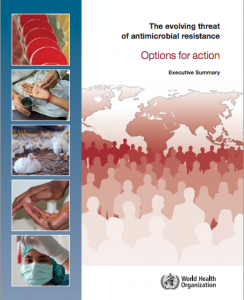 Antimicrobial resistance (AMR) is not a recent phenomenon, but it is a critical health issue today. Over several decades, to varying degrees, bacteria causing common infections have developed resistance to each new antibiotic, and AMR has evolved to become a worldwide health threat. With a dearth of new antibiotics coming to market, the need for action to avert a developing global crisis in health care is increasingly urgent. In addition to a substantial financial burden that national health-care budgets can ill afford, AMR has economic consequences far beyond the health sector, such as damaging repercussions on international travel and trade resulting from the cross-border spread of resistant infections. The cost of not acting against AMR needs to be considered when deciding resource allocation and assessing interventions.
Antimicrobial resistance (AMR) is not a recent phenomenon, but it is a critical health issue today. Over several decades, to varying degrees, bacteria causing common infections have developed resistance to each new antibiotic, and AMR has evolved to become a worldwide health threat. With a dearth of new antibiotics coming to market, the need for action to avert a developing global crisis in health care is increasingly urgent. In addition to a substantial financial burden that national health-care budgets can ill afford, AMR has economic consequences far beyond the health sector, such as damaging repercussions on international travel and trade resulting from the cross-border spread of resistant infections. The cost of not acting against AMR needs to be considered when deciding resource allocation and assessing interventions.
The evolving threat of antimicrobial resistance – Options for action, a new document from the World Health Organisation, describes examples of policy activities that have addressed antimicrobial resistance in different parts of the world, with the aim of raising awareness and in particular to stimulate further co-ordinated efforts.
Read more about Antimicrobial Resistance in Physiopedia